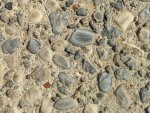This is not a new pool.
We have exposed aggregate that is rough as a cheese grater. I'm thinking of renting a concrete grinder to just knock off the worst of it, certainly not polish it or make it slippery.
Home Depot rents a concrete grinder that will do jobs like this.
Does anyone have any experience doing something like this?
Thanks in advance!
We have exposed aggregate that is rough as a cheese grater. I'm thinking of renting a concrete grinder to just knock off the worst of it, certainly not polish it or make it slippery.
Home Depot rents a concrete grinder that will do jobs like this.
Does anyone have any experience doing something like this?
Thanks in advance!


